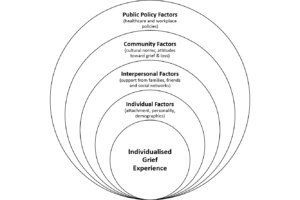
Expectant parents do not anticipate birth and death to collide. However, for millions of families worldwide each year, the death of their baby due to miscarriage, stillbirth, or neonatal death within the first 28 days of life, is a devastating reality.
Historically, parents’ grief over these losses remained unacknowledged. Over the past few decades, research into the emotional burden of grief has resulted in the development of sensitive healthcare and psychosocial support for families. However, bereaved parents continue to report stigma and societal norms which can minimize their loss.
Men and baby loss
Men are increasingly involved in pregnancy and childbirth. Nevertheless, what we know about men’s grief when a baby dies before or shortly after birth remains somewhat limited. Most previous research and subsequent bereavement care guidelines focus on the experiences of heterosexual women, despite men reporting feeling overlooked or ‘forgotten’ as grieving fathers. As one father in our earlier research described:
“Every time I’d get a text from my friends the text was like how’s [female partner]? […] but you know, the father is just as upset even though he doesn’t necessarily show it in the same way” (John, father to stillborn baby)
Therefore, to develop a more-comprehensive understanding of men’s grief following pregnancy/neonatal loss, our recent systematic review, published in BMC Geriatrics, summarized existing research on how men experience grief and the factors which contribute to men’s grief.
‘It’s complicated’
Our searches identified 46 relevant studies. Grief was highly individual, however, men do seem to face specific challenges which may complicate or delay their grief, and differ from the experiences of women.
We need wider strategies and policies that recognise men as grieving fathers.
For example, there was a general trend towards more problem-focused coping strategies such as ‘keeping busy’ or using distractions including activities or work. Feelings of helplessness and powerlessness were also common, along with responsibilities to care for other children, complete paperwork, organize a funeral/burial, and inform family and friends of the loss. Importantly, a tension also existed between expressing their grief and holding it in or “being strong” to support their female partner and family.
In studies comparing men and women, men generally scored lower on grief measures than women. Importantly, however, the way we currently measure grief may not capture the complexities of men’s grief. Several studies highlighted that commonly used measures may not be sensitive to differences in styles of grief that men may exhibit (e.g., ‘doing’ versus ‘feeling’).
Four levels
The factors affecting grief varied across studies. Broadly, we grouped these factors into four different levels: individual, interpersonal, community, and public policy.
At the individual level, factors included men’s personality, their demographic background, and their attachment to the unborn or newborn baby. In general, men who had developed a strong bond with their baby experienced more intense grief.
At the interpersonal level, support and acknowledgement from family, friends, and healthcare professionals were critical in determining how well men could express and navigate their grief. A lack of recognition or support led to feelings of isolation which worsened grief.
At the community level, cultural norms relating to grief and masculinity ideals often led men to feel as though they needed to be the “strong one” or “supporter” to their female partner, rather than a grieving father. This role often took precedence over men’s own needs.
Finally, policies relating to bereavement leave in the workplace, and the woman-centered nature of pregnancy and maternity care, had the potential to contribute to a sense of isolation for men. Three studies identified that a lack of bereavement leave options for men impacted upon how well they were able to work through their grief, and in seven studies, a focus solely on women’s health, especially in the hospital environment, left many men feeling removed and unsupported.
A broader concept of grief
Given this range of factors that appear to affect grief, we have proposed a socio-ecological model of men’s grief, which recognizes that grief does not exist in isolation. Rather, it is shaped by a complex system of interacting factors and levels. Without strategies to address factors at each level, we risk increasing men’s isolation and decreasing both perceived and real access to support.

While individual grief counselling and support groups are important, we also need wider strategies and policies that recognise men as grieving fathers. Suggestions include hospital programs that genuinely engage with fathers and promote an equal partnership throughout pregnancy and childbirth; campaigns to raise awareness of the impact of pregnancy/neonatal loss on families, including men; and evaluating current workplace policies for bereavement leave, to afford men equal opportunity to mourn their loss and access appropriate psychosocial supports.
Comments